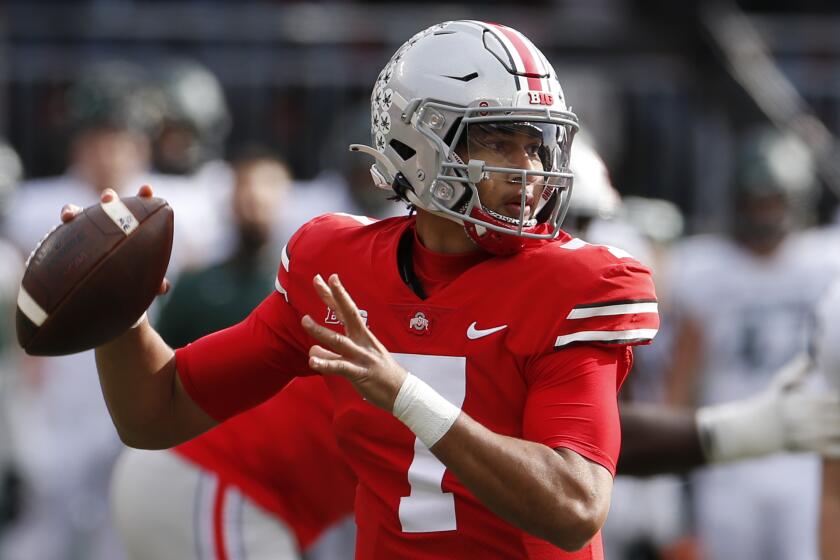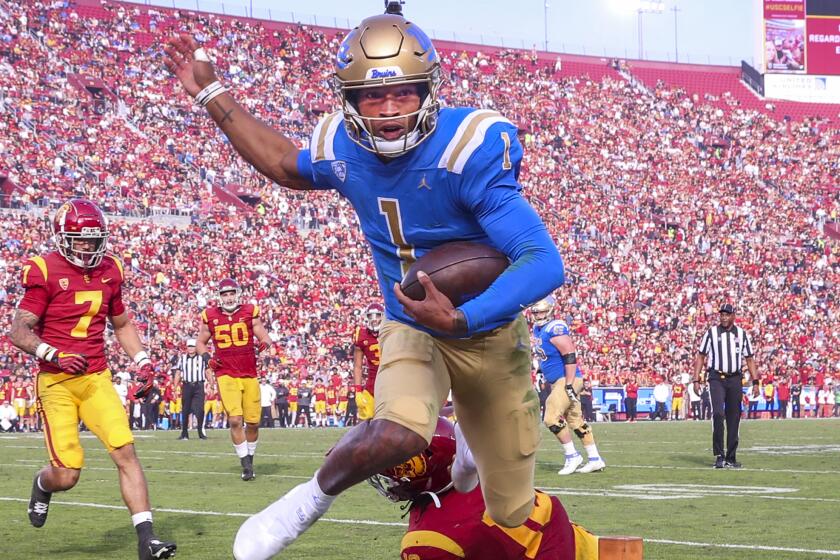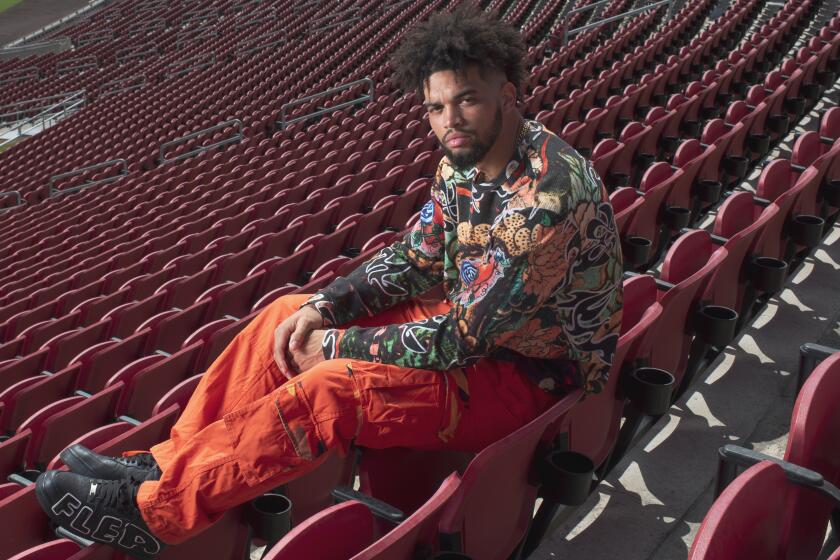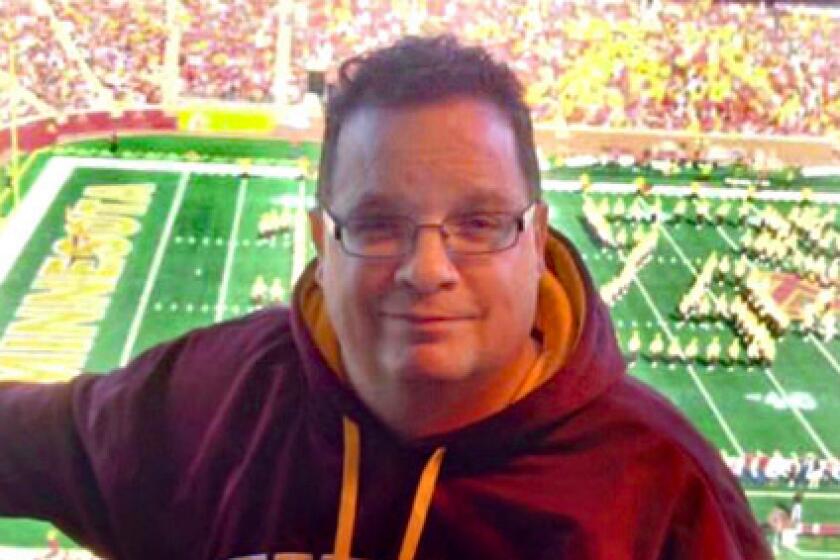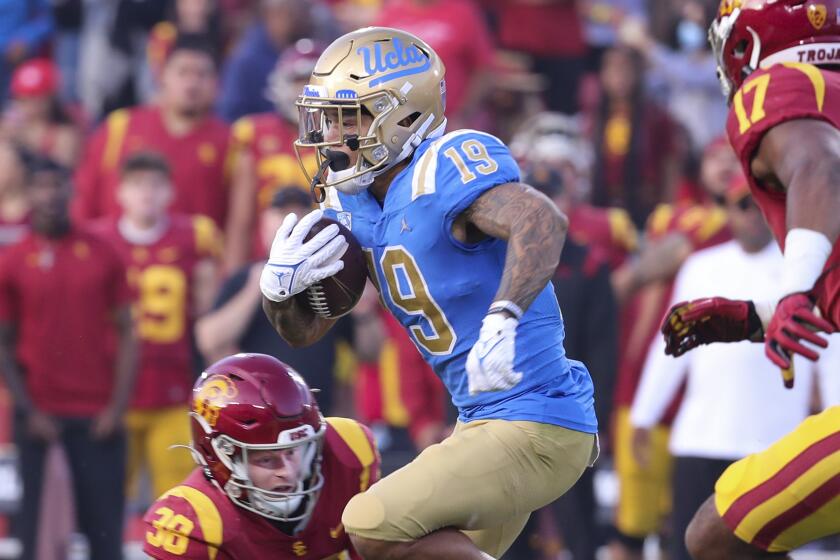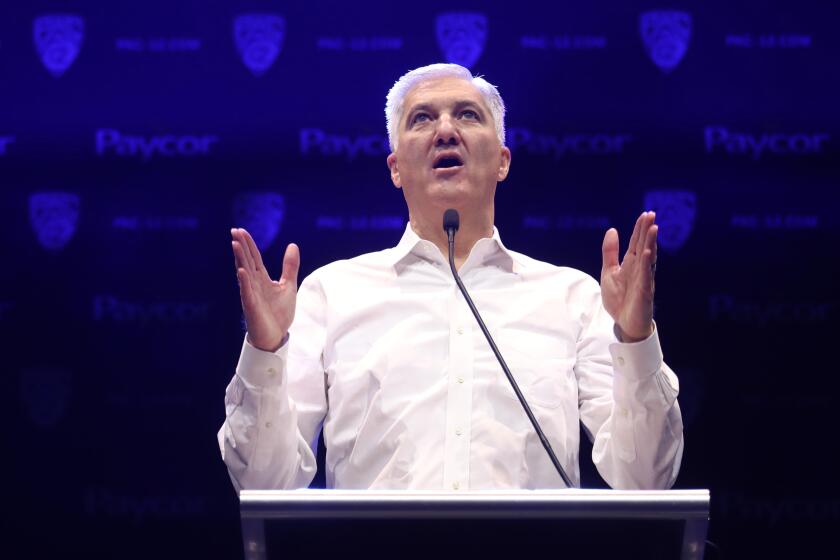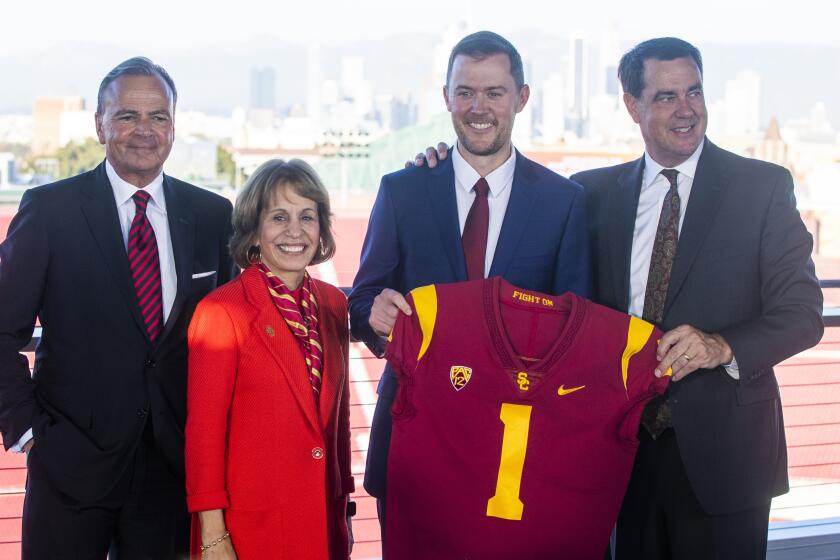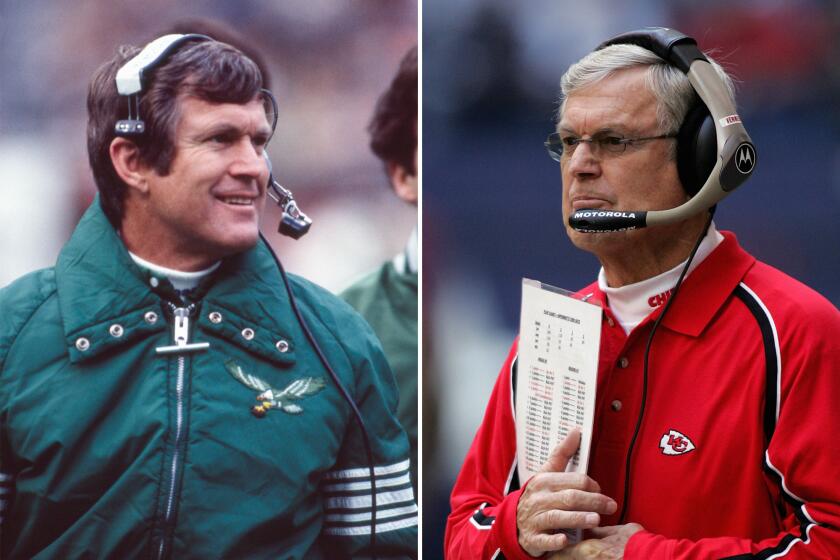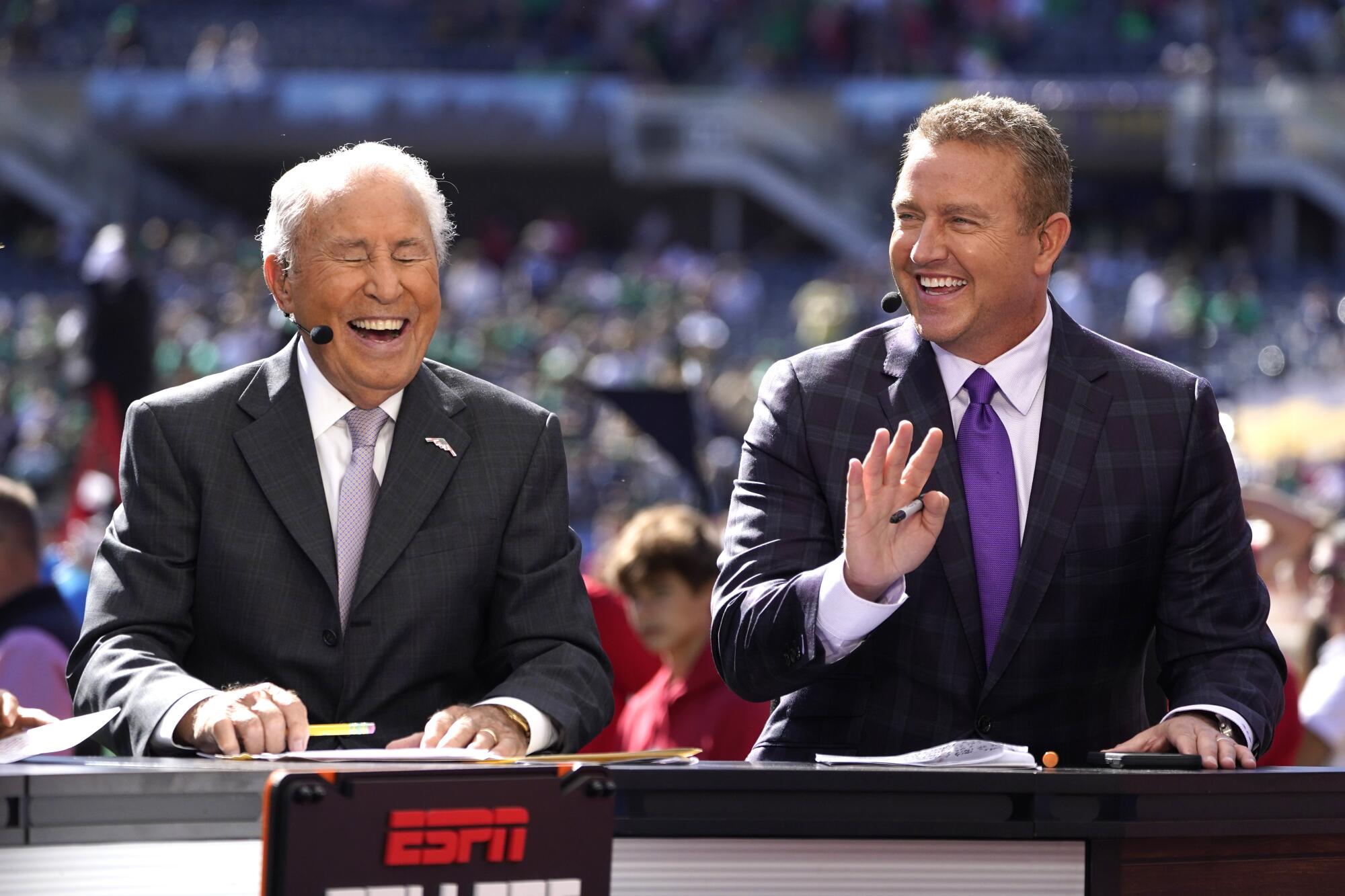
- Share via
MURFREESBORO, Tenn. — Kirk Herbstreit steps to the lectern and clears his throat. Two cameramen crouch in front, capturing him from alternate angles — one locked on his made-for-TV visage and the other set to pan across his body once he starts delivering his lines.
How did he get here, to a lecture hall at Middle Tennessee State University on a late summer day, surrounded by mascots, marching band members, cheerleaders and die-hard fans ESPN has summoned from around the college football universe?
For Herbstreit, standing at the center of the sport’s unmistakable pageantry has always felt perfectly natural, like a calling from birth. This commercial, while contrived, should serve a twofold purpose: to remind people why they continue to worship a sport that many feel has lost its way — and that, no matter how much the game changes, no matter how much fun he has broadcasting Thursday night NFL games on Prime Video with Al Michaels this fall, Herbstreit’s heart still beats to college football’s delirious drum.
Ahem.
“What makes for a great story?” Herbstreit begins, the room rapt.
Herbstreit appears as smooth, as in control of the space around him, as the audience would expect from a seasoned veteran. But beneath his practiced polish is a man fundamentally transformed since last college football season, a man who has been forced to stare down his own mortality.
J. Brady McCollough and his friend Sam pick the winners of every Power Five conference and predict who will win the College Football Playoff title.
Back in the spring, a cluster of blood clots passed through Herbstreit’s heart and nestled into his lungs.
“Man, you caught a break this time,” the doctor would tell him.
Those words echo in Herbstreit’s mind as he prepares to tackle a tremendous trifecta: Adding a Thursday night Amazon NFL broadcast to his usual Saturday doubleheader of “College GameDay” and ABC’s prime-time game of the week.
The script he’s reading now aptly describes the existence he’s chosen.
“Is it drama? Action? Adventure? Or is it love?” he says.
“Not just love love, but the kind of love that makes you do crazy things.”
The folks gathered here in front of Professor Herbstreit, who’s sporting a dark blue suit with a red-tinted tie, don’t need much convincing about the brilliance of college football. They have done a crazy thing by traveling hundreds of miles to rural Tennessee to possibly flash on screen during one second of a one-minute commercial. Their zealotry makes them Herbstreit’s people; they’re almost sure to get an ‘A.’
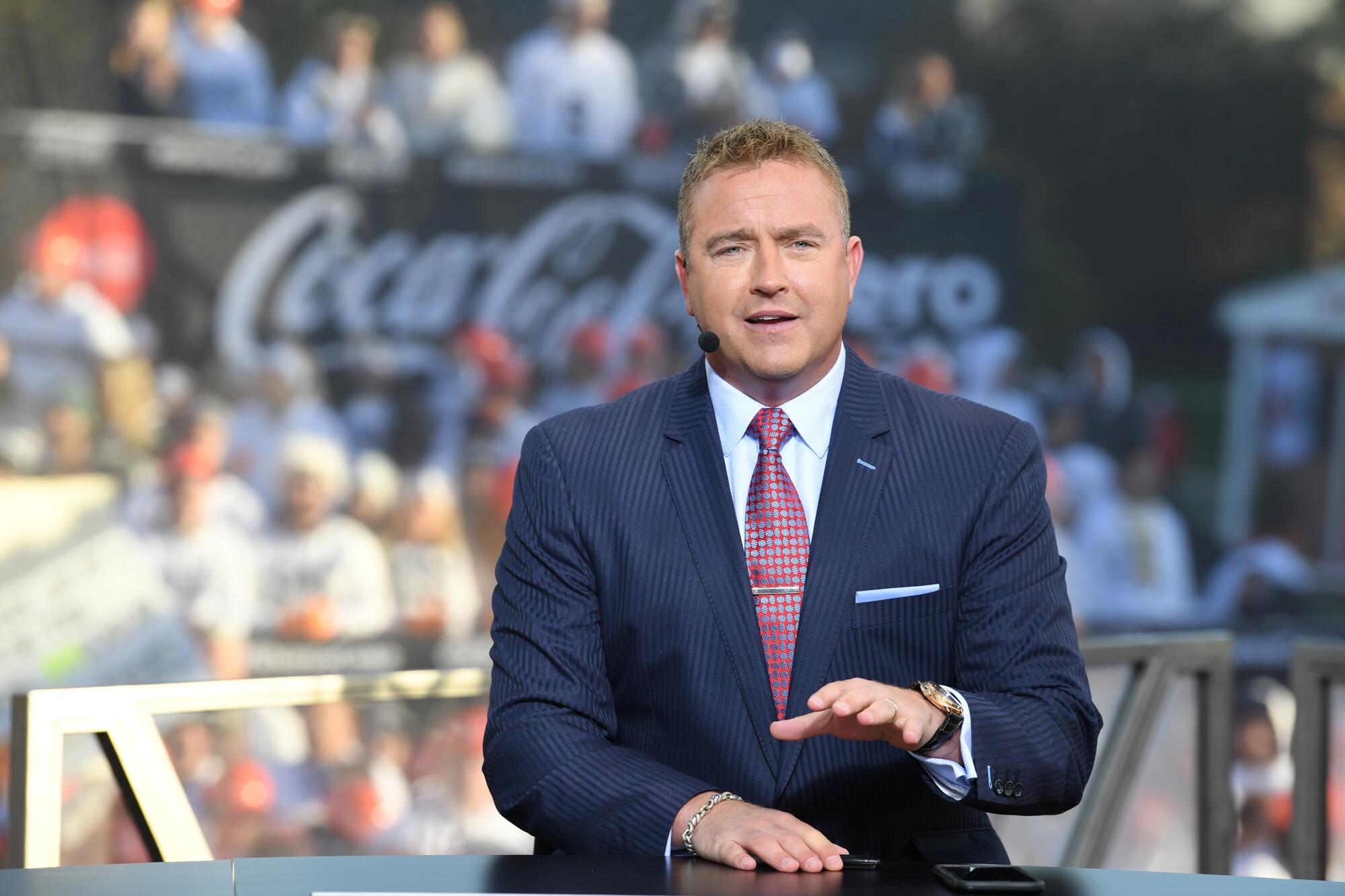
“That’s not what NIL was about. It was about Bryce Young or CJ Stroud or a guy who was established on the field creating marketing opportunities. It’s not about trying to outbid another booster to try to get a recruit. That’s just not a healthy model.”
— Kirk Herbstreit, on NIL collectives
Herbstreit looks out on a dimly-lit room packed with the passion that has encompassed his life. There’s Rameses the ram from North Carolina, Sebastian the ibis from Miami, the stuffed version of Bevo from Texas. There’s the sousaphone player from Ohio State who dots the ‘i’ in the marching band’s famed pregame routine. Producers have predictably sat him next to two Michigan cheerleaders.
Traditions like “The Game” are the embers that get Herbstreit fired up for a 27th year of college football commentary. Their permanence, maybe even more than their pageantry, is what sustained him as a boy who yearned for a more stable life at home with his father, Jim Herbstreit, a hard-nosed Ohio State captain under the legendary Woody Hayes.
When it comes to his views on college football, even as he tries to evolve with the times, Herbstreit remains firmly his father’s son, the talented prep quarterback who picked Ohio State because the school was in his blood, who stuck with his commitment for four years while being continually passed over, who finally won the starting job his redshirt senior season, who never made an extra nickel off his well-earned notoriety.
College football today can be hard for the son of Jim.
“When he dies, if he was cremated, my guess is he’d want half his ashes spread at Ohio Stadium and the other half spread at the Rose Bowl,” says friend and ESPN colleague Gene Wojciechowski, who co-wrote Herbstreit’s memoir. “And when you think about those two places, they’re the personification of traditional college football. Kirk is a traditionalist.”
USC and UCLA are leaving the Pac-12 for the Big Ten Conference in 2024, the two schools announced Thursday.
Some of the qualities that pulled Herbstreit into the sport, that compelled him to give his life to it, appear to be disappearing right before his eyes. Fans who are feeling lost in the new world can see themselves in him if they look closely enough.
But that isn’t the Herbstreit they’ll see when the commercial, themed “The Greatest Story Ever Played,” airs this week to kick off the season. As his longtime “GameDay” mentor and confidant Lee Corso tells him often, “We’re in the entertainment business, and college football is our vehicle.”
Herbstreit’s bond with Corso has only grown tighter with time, and Kirk has leaned on Lee more often during the turbulent months of 2022.
“And … action!” the director says.
“A great story has to have heroes we can root for,” Herbstreit recites.
“It has magic. It has power. And every once in a while, it has miracles. …
“And as luck would have it … That’s our story.”
The crowd jumps to its feet and roars raucously. When the work is done, Herbstreit thanks everyone for their patience, exits the lecture hall and walks through campus accompanied by the Cincinnati Bearcats mascot, which somehow just feels normal.
Kirk Herbstreit still has the penetrating blue eyes. He still has the sturdy frame of a quarterback meant for the pounding of a triple-option offense. But his trademark boyishness? If we’re being honest, that quietly escaped him sometime in his 40s — possibly around the time his twin boys started getting recruited to play college football and take their place in the family business.
During his lunch break, he sits in a classroom on the MTSU campus apart from the commercial’s hysteria. He picks through a boxed salad with salmon. In a few weeks, he will turn 53, and, now more than ever, he is trying to watch his health. Deep down, he is still recovering from that April day when he received a chilling reminder that this could all be taken away in a split second.
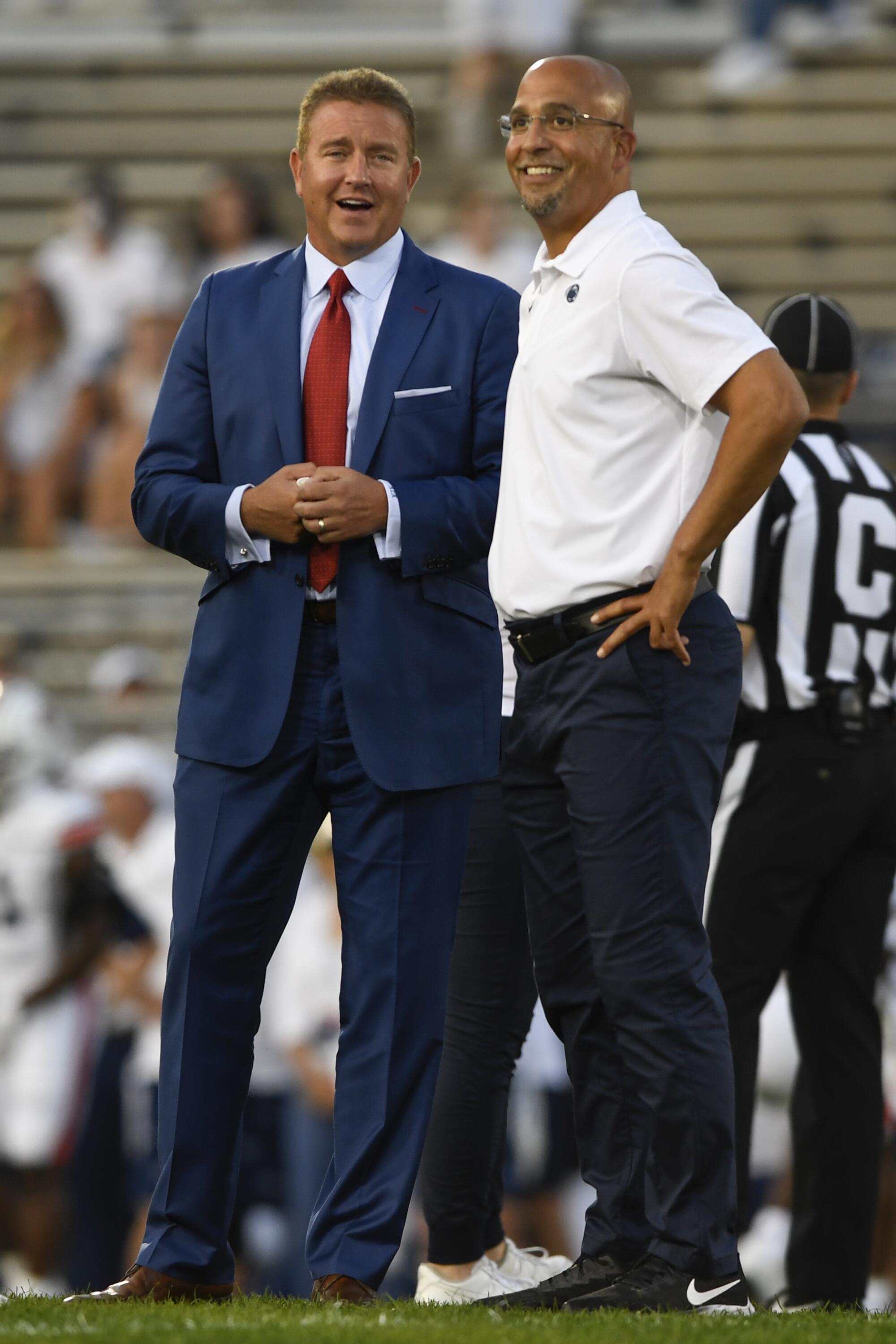
At first, he thought it was a calf pull. Then he noticed pain on the right side of his chest as he lay in bed. Then he felt shortness of breath. None of it made any sense to him, so he called a cardiologist friend in Columbus and paid him a visit.
“Your heart arteries are crystal clear, look great,” Herbstreit recalls the doctor saying. “But, you’re not going to believe this: You have clots in your lungs.”
Herbstreit went back home to Cincinnati and had a scan of his right calf. More clots.
“Somehow they got into my bloodstream, went through my heart and into my lungs,” Herbstreit says. “Once it got into the lungs, it’s like a dead end. They’re in your lungs, but they go through your heart. That’s where people die. … And so I was just like, ‘Damn.’ ”
Herbstreit immediately got on blood thinners. He felt better within a few days, but he still sat out ESPN’s NFL draft coverage. Entering a challenging fall that will send him around the country, making three stops over a three-day span, he says he has a clean bill of health.
Caleb Williams and his father share the strategies they have used to put the USC quarterback in the best position to win on and off the field.
His blood may no longer be thick, but certain college football topics can get it boiling. Like the current trend of high school players being induced to commit to a school using lucrative payments from booster collectives that are cleverly disguised as “name, image and likeness” agreements.
“That’s not what NIL was about,” Herbstreit says. “It was about Bryce Young or C.J. Stroud or a guy who was established on the field creating marketing opportunities. It’s not about trying to outbid another booster to try to get a recruit. That’s just not a healthy model.
“It’s terrible for the sport. It puts these coaches in weird spots. What I’m about is the next wave — the ESPN money, the Fox money, it’s going into the Big Ten from Fox and the SEC from ESPN. I’m all about the players saying, ‘Forget NIL. Let’s negotiate and get a share of those dollars. Oh, we’re going to a 16-team playoff? How many billions of dollars? OK, we need a share of that.’
“But I don’t like what it’s started out with the recruiting … I went to this school and got offered this, next week I’m gonna go to that school and get offered this. That is a bunch of bull—.”
Greg Flugaur says he’s a nobody. Perhaps that’s true, but the well-connected Minnesota fan was the first to report USC’s interest in joining the Big Ten.
He brings up Downey Warren quarterback Nico Iamaleava’s controversial commitment to Tennessee.
“How can an adult with a good conscience say this is awesome for the sport?” he says. “What’s going to happen when the kid from [Warren], as an example? Hopefully he’s a great player. But, with the reports about [him receiving] three years, $8 million, what if he doesn’t? What if he struggles? What happens then? I mean, that’s gonna happen eventually. How those guys in Knoxville gonna feel about that? How’s it gonna go over in a locker room, you know?”
It’s clear Herbstreit is trying to be fair to today’s player too. Even five years ago, he is not sure he would have been able to wrap his mind around revenue sharing, which is actual pay for play, and athletes collectively bargaining with their conferences and schools.
Those in Herbstreit’s small inner circle have observed him putting the work in to process the sport’s new direction and to have the right things to say to help viewers understand it all too.
“There’s a major difference in somebody who has this as a seasonal assignment and somebody who it’s their life. It’s been Kirk’s life,” says Chris Fowler, Herbstreit’s ABC booth partner and longtime “GameDay” host. “He’s immersed in it. He feels it deeply. He’s not jaded, and that’s important.
“He’s become more aware of his responsibility, the amplitude of his voice in the sport. Speaking for myself, I find it easier just to do my job. Kirk has a big platform, and I think he enjoys using it, expressing his sensibilities. But it works because he’s so authentically passionate about the sport. It’s heartfelt, and that’s why it connects.”
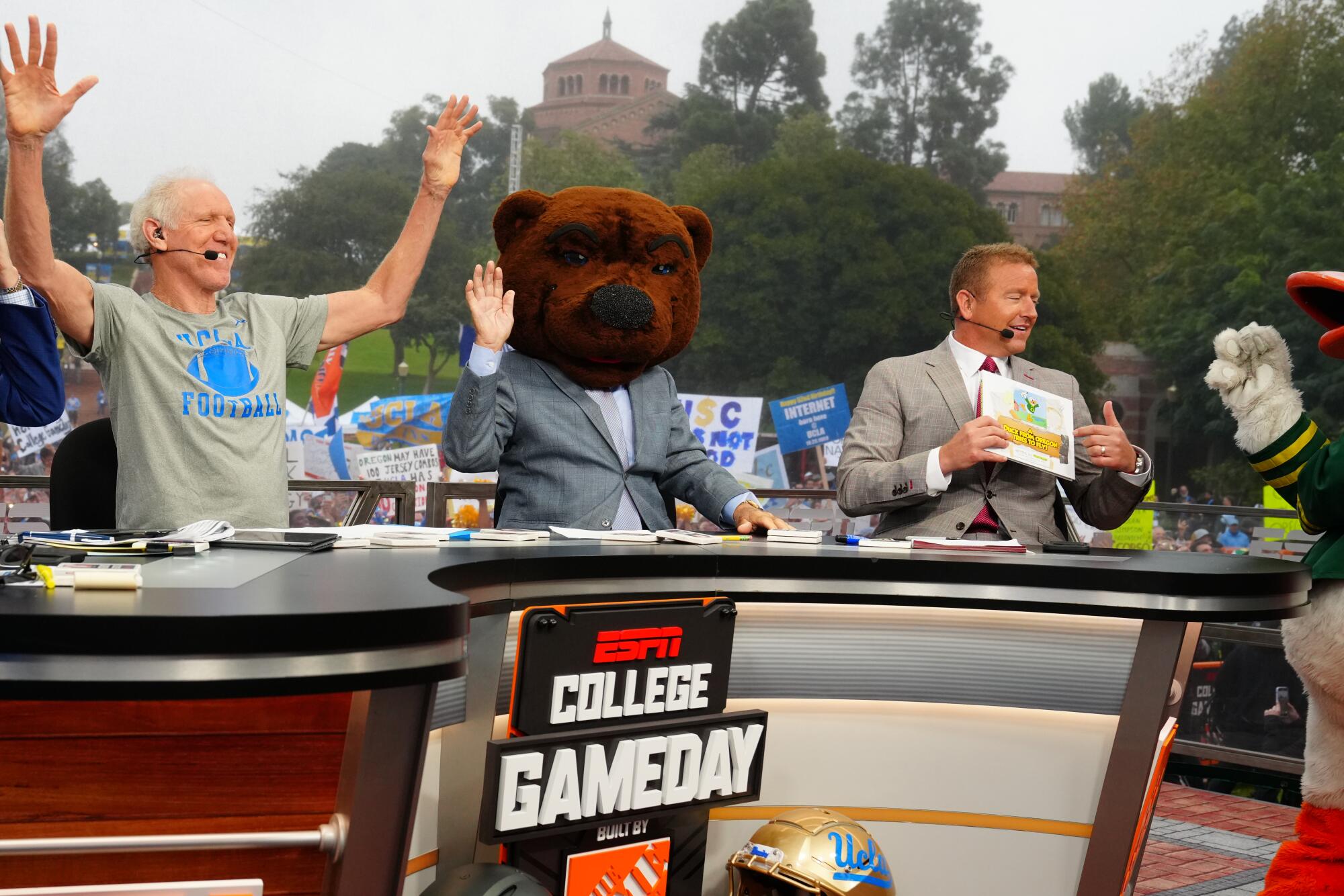
Herbstreit’s story is college football’s story. The sport is at a crossroads, and it is calling him to help bridge the gap between what’s been and what’s to come.
He’s willing, but he can’t be expected to just forget the foundation that forged him.
“If I didn’t get a scholarship, I would probably have joined the Marines,” he says. “We didn’t have any money in my family. My sister paid off student loans until her early 40s. So I had a real appreciation for, you are getting something, you know, an education, not just the monetary value of an education but what it does potentially for your future. But today, it’s just different.”
Only three years went by between Kirk Herbstreit throwing his last pass as an Ohio State Buckeye and him tossing a Hail Mary audition tape to ESPN’s talent scouts in Bristol, Conn. “GameDay,” the network’s weekly studio show that was growing in popularity as a road trip adventure, had an opening for an analyst after Craig James left the show.
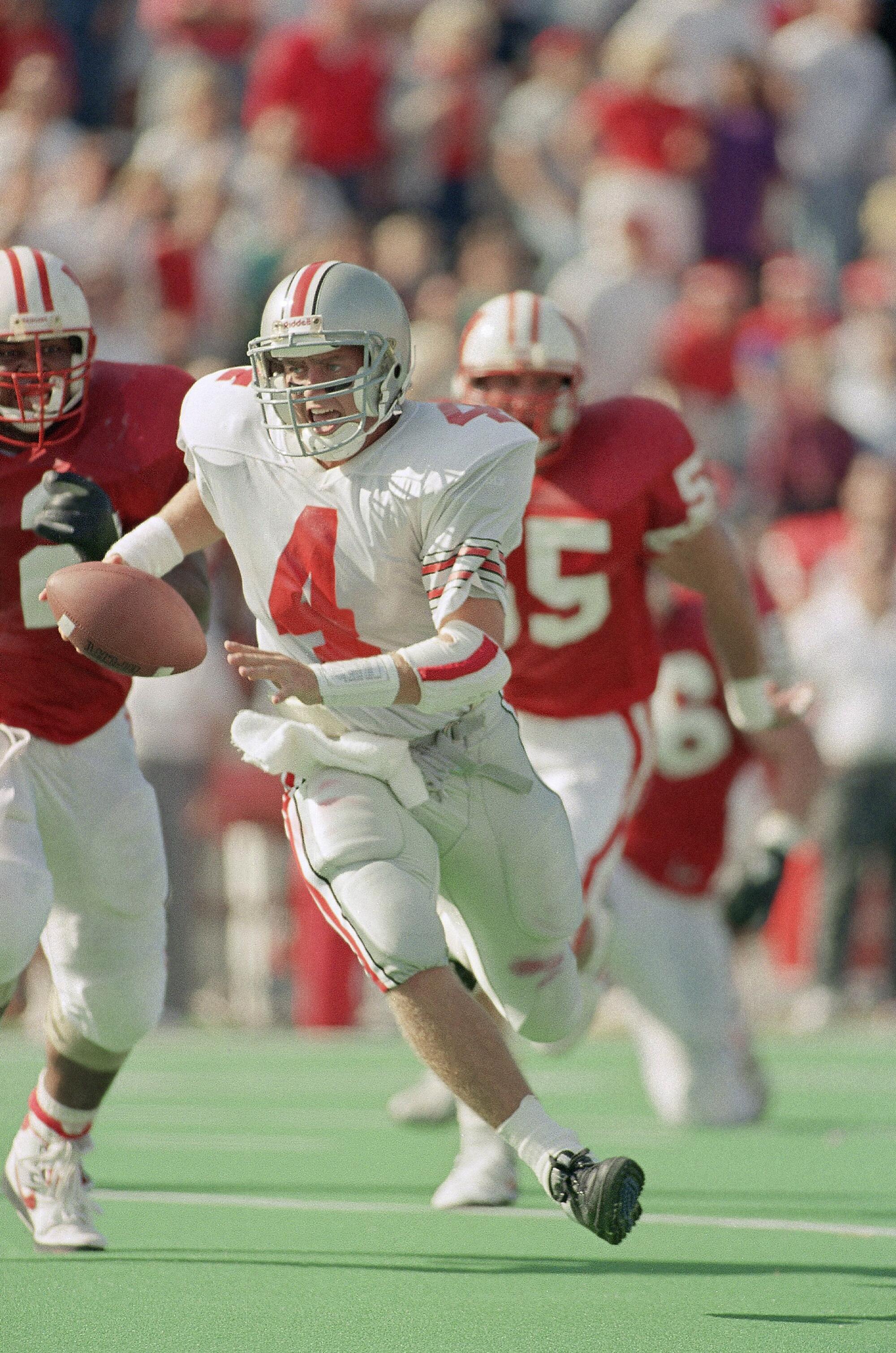
Herbstreit had only done sideline reporting and hosted a radio show in Columbus after his playing career ended, but he was one of the few applicants who rose to the top for an audition.
“Without a doubt, he sweat more than anybody I’d ever seen,” Corso recalls. “He was sweating through his clothes.”
Says Fowler, “He was incredibly nervous, or appeared to be. He looked rattled. But what he said was excellent. It was fresh. He wasn’t a guy doing an impression of a TV analyst. He was just talking football.”
All Corso needed to know about “Herbie,” as he’s affectionately called by “GameDay” staff, was that he was a coach’s son.
“That meant a lot to me,” Corso says, “because I knew he would be the right kind of guy for the show. It’s a special place for coach’s sons.”
Jim Herbstreit coached as an assistant under Hayes at Ohio State and Bo Schembechler at Miami of Ohio before eventually leaving the profession.
Many years after Hayes died, Kirk would proudly tell the story of Hayes once saying Jim was the toughest pound for pound of all the Buckeyes he coached. The elder Herbstreit never met a wall he wouldn’t crash into for the good of the team, and he’d pay for that dearly later.
The Big Ten’s new TV agreement with Fox, CBS and NBC is worth nearly $8 billion. It will liberate USC and UCLA from after-dark kickoffs.
In his book “Out of the Pocket,” Kirk expresses regret on his dad’s behalf that he did not stick with coaching. He believes deep down that Jim would have been in line to replace Hayes instead of Earle Bruce.
“His dad was a ball coach,” recalls Deron Brown, one of Herbstreit’s best friends and teammates from his high school and college days. “One of the biggest compliments he ever gave me was, ‘Woody would have really loved you.’ Coming from him that was like hearing it from Woody himself.”
Jim handed out little nuggets of gold like that to Kirk and his friends over the years, but he was not emotionally accessible. The marriage with Kirk’s mother, Judy, was rocky. They divorced when Kirk was young. She would later tell Kirk that her husband was never the same after a hit he took during an Ohio State game that left him stumbling around the field.
Eventually, Kirk put walls up around his heart. Brown was one of the few who knocked them down.
“Really shy,” Brown says of his friend. “We didn’t know the word back then, but introverted. If you look back, he was just very, very shy. But he was a phenomenal athlete. He always had that innate ability to lead, but you know, fast forward 30 years since college, to see what he’s done for a living and the way he’s done it has been pretty amazing.”
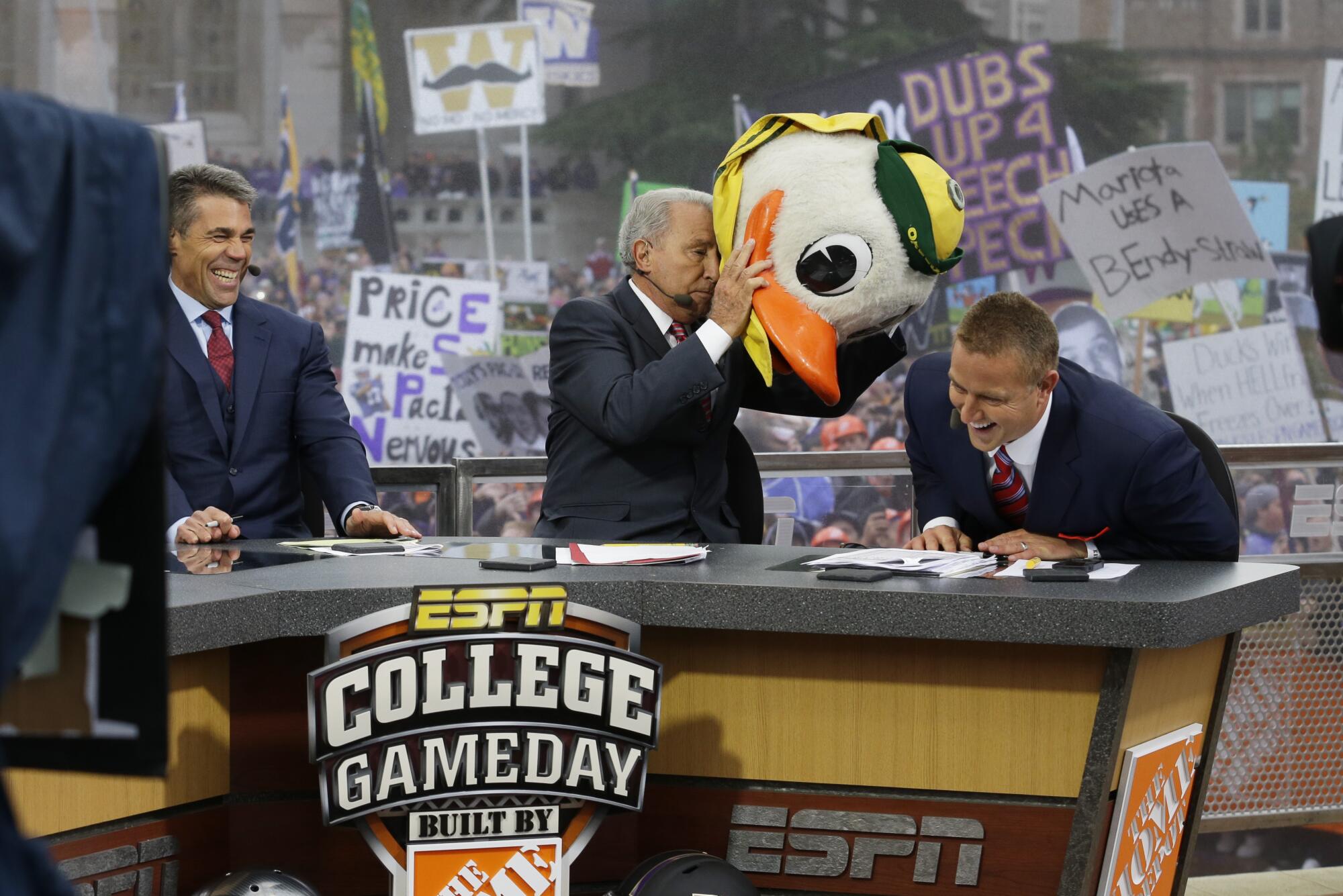
Herbstreit got that fateful call from Bristol and signed on for the 1996 season. College football fans have been watching him grow up in real time, sitting to the left of the wild and wacky Corso, ever since. In today’s media-driven era, with dozens of games spread across 14 addicting hours of television on countless channels, it could be argued that “Lee and Kirk” have the kind of hold over the sport that “Bo and Woody” once had.
On the inside, though, Herbstreit has always been uncomfortable with the trappings of fame. He has tried as much as possible to keep his guard up and protect his family. Moving to Nashville, Tenn., and later Cincinnati from Columbus helped.
But if you were patient and respectful enough to build an authentic connection with Kirk, he was happy to bring you along for the ride. Herbstreit hired Brown as his spotter for TV broadcasts, which was just one of the ways his friend would help Kirk navigate life in the spotlight.
“He meets a person and he just puts himself out there right away,” Herbstreit says of Brown. “He trusts people before he really gets to know them. I’m the opposite. I’m more … analyze, watch, observe. And then I’ll get a little closer. I’m very, I guess, careful when it comes to relationships. I have to get there on my own time, you know? And maybe that is some of the stuff I went through as a kid.”
In 2009, after Kirk called the Ohio State-USC game in Columbus, he and his family realized Jim had gone missing. They later found out he left the stadium with the intention of walking back to Kirk’s house, which was about five miles away. It was the first obvious sign that the sacrifices Jim made for Woody as a player were catching up to him.
What does the Pac-12 commissioner think about USC and UCLA leaving the conference for the Big Ten?
Jim suffered from dementia until his death in 2016.
“There were a lot of times where I was left wanting more,” Kirk says. “And then to have him go into that stage. It’s just unfinished business, right?”
He has counted on Corso — who recovered from his own health scare in 2009 when he suffered a stroke — more and more over the last decade.
“He listens,” Herbstreit says. “That’s what I struggled with with my dad. There’s nothing worse than opening up your heart and someone goes, ‘Oh wow, that’s crazy. Yeah.’ That’s what my dad did. Lee, I found when I would talk to him, he was, like, listening. And so I would talk to him about getting married, having preemies, and he was Yoda like. He would sit there and listen, and listen, and listen. And then he’d be like, one sentence, just clarity. It’s an incredible gift.”
The tenderness shared between Corso, now 87, and Herbstreit is a gift that keeps on giving for college football fans.
“When Kirk was starting out on the show, it was Corso who was his safety net,” Wojciechowski says. “And now the roles have been reversed, and Kirk does so lovingly and without hesitation. It’s like breathing to him.”
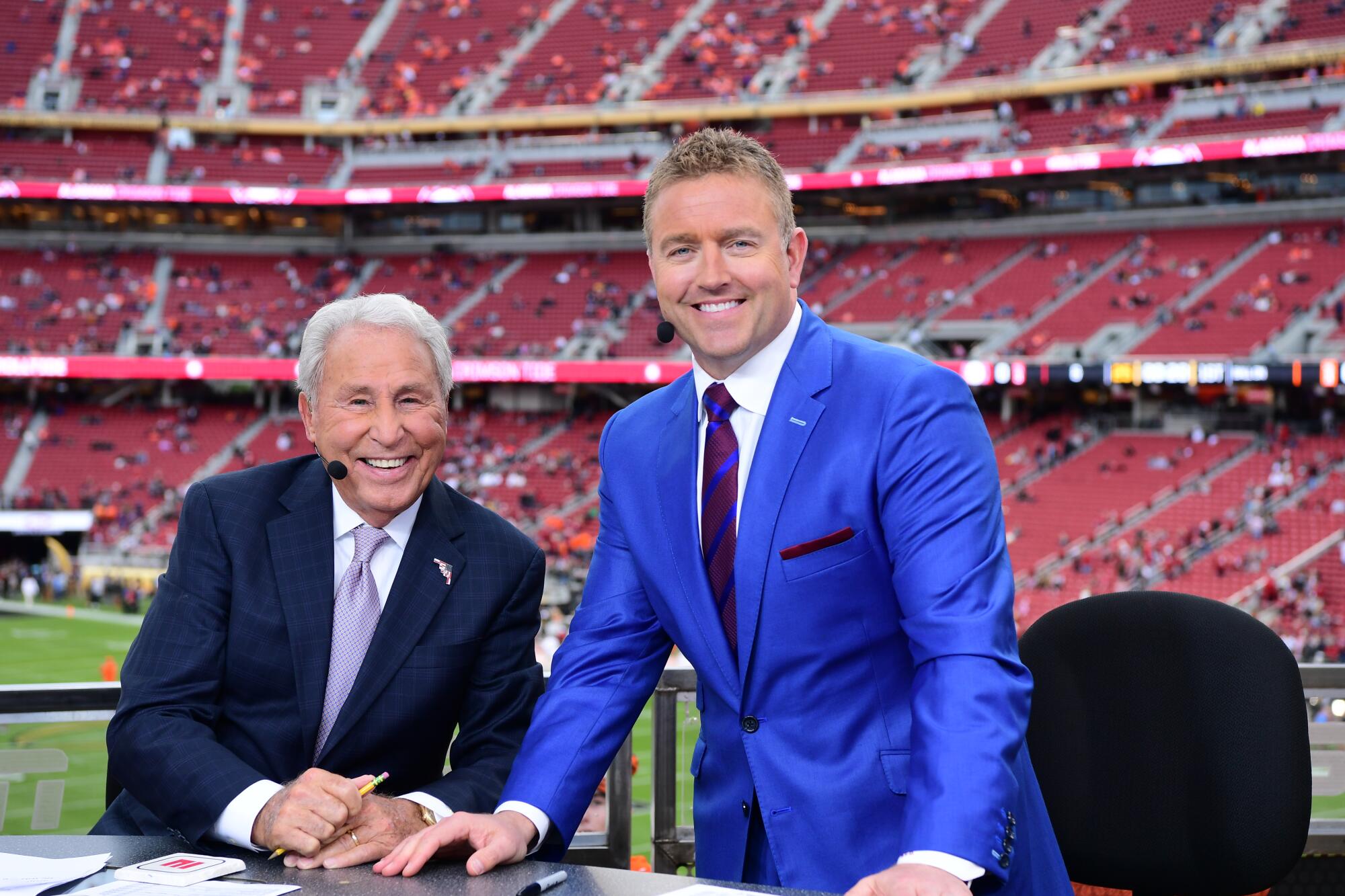
“Damn right I’m worried about him. I’m worried about him taking care of himself. All I know is, I told him, I had a stroke, and it almost killed me. I’ve been on blood thinners for 13 years. Don’t screw around.”
— Lee Corso, on Kirk Herbstreit’s health
In recent years, Herbstreit has surprised even himself with his increased public vulnerability. First, in the spring of 2020 as the sports world shut down because of the pandemic, he finally agreed to do the book with Wojciechowski. And it was later that year that Herbstreit broke down in tears on “GameDay” discussing racial injustice in America.
He recited a famous Benjamin Franklin quote that was offered to Kirk by Stanford’s David Shaw, a Black head coach: “Justice will not be served until those who are unaffected are as outraged as those who are.”
“When I read that, I could feel my body, like, ‘Oh there’s a fork in the road, which way am I gonna go? Am I gonna keep going here or do I get off at the exit and take it easy?’ ” Herbstreit recalls. “And I just kept going. I don’t even know what happened. There was no intent. It was just me saying, you know, why is this happening?”
Herbstreit would soon become the butt of jokes and, much worse, the target of true derision for what his critics assumed had to have been a planned performance.
But Corso knew better.
“It was sincere, came from the bottom of his heart,” Corso says.
During a call with Pac-12 university presidents and athletic directors last year, USC President Carol Folt ‘shut down’ potential expansion plans.
Last spring, as Herbstreit grappled with the Amazon NFL opportunity and his future path at ESPN, he went to Corso.
As usual, the old man kept it simple for him.
“Don’t give up ‘GameDay’ and take that face off of television, that’s what I tell him,” Corso says. “Let everybody else talk behind a microphone. He’s aged, but he’s still a good-looking guy.”
Herbstreit remembers a conversation with a more serious tone.
“When the ESPN and Amazon stuff was going on, I started to get … you know … towards ESPN. I was just kind of, like, this is kind of weird,” he says. “And then Lee set me straight very quickly on my approach, my attitude, and he goes, ‘You need to stay true to who you are.’ He told me what I didn’t want to hear. But he was right. So I was, like, back in line and doing what I was supposed to do.”
On a recent Friday night in Los Angeles, Kirk Herbstreit celebrates his 53rd birthday by watching his son Chase’s high school football game via a streaming app on his phone. Chase isn’t on the field — he is the team’s backup quarterback as a sophomore — but that doesn’t stop Kirk from peeking in during a break as Amazon stages a rehearsal broadcast for its new NFL team from SoFi Stadium.
Earlier in the week, Herbstreit was in Charlotte, N.C., for an ESPN seminar. He flew home Wednesday night to change his bag, then left Thursday morning for L.A. and his first time in the booth with the legendary Michaels.
“I wouldn’t even know it was my birthday,” he says. “I’m just preparing. I know it’s a practice game, but I’m trying to do it like it’s a game, you know?”
After this, he’ll fly home, before doing a Pizza Hut commercial on Sunday. Then Monday he’ll fly to Arkansas to talk with a group of Razorbacks supporters. And on and on it will go, until sometime in January.
Whew.
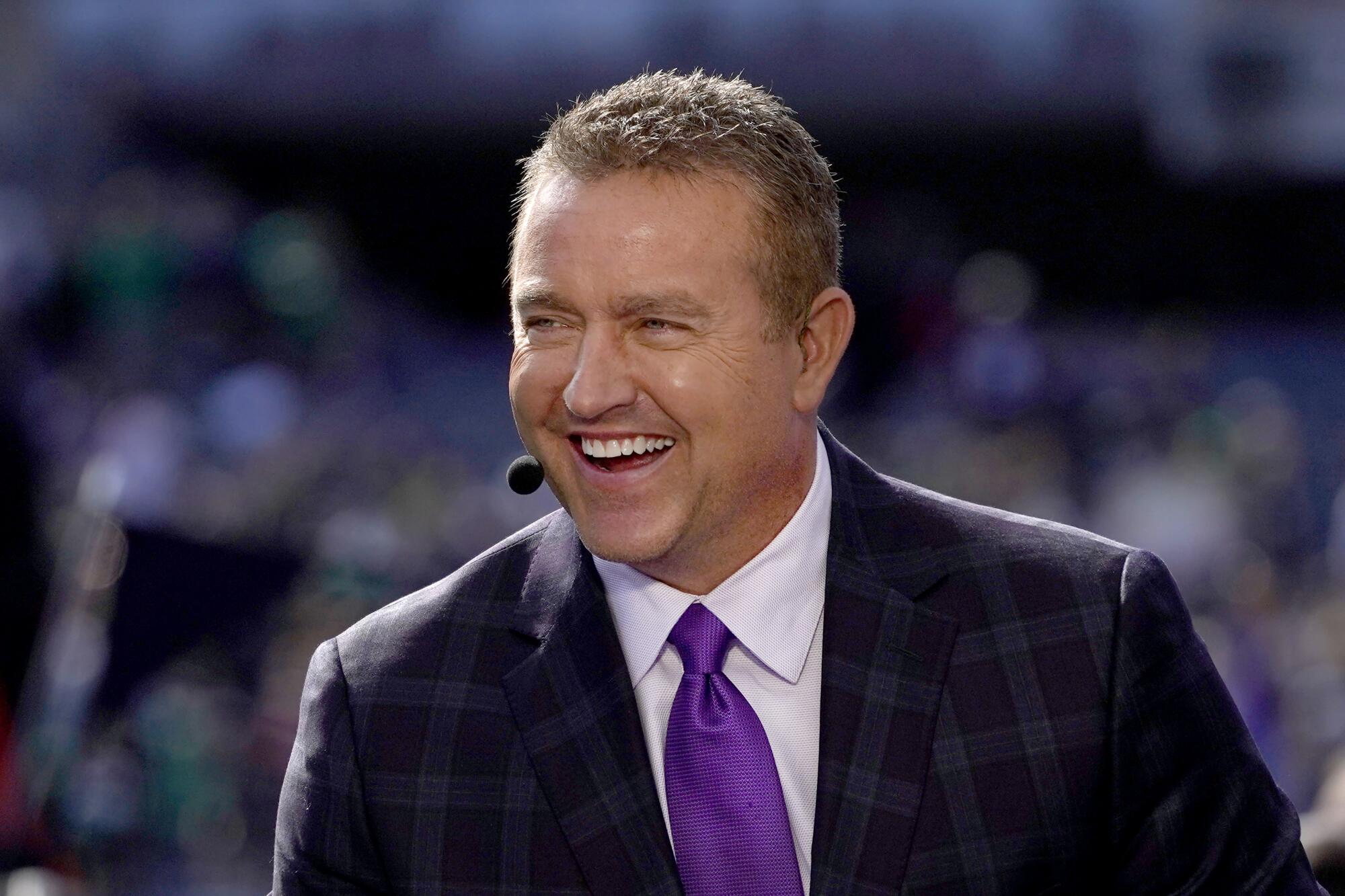
Nobody who has watched Herbstreit work the last three decades has any doubt he will excel doing the NFL and working alongside one of the best who’s ever done it. But anybody who knows what happened to him in April, how close he was to an unforeseen tragedy, has questions about what he’s about to take on.
“Damn right I’m worried about him,” Corso says. “I’m worried about him taking care of himself. All I know is, I told him, I had a stroke, and it almost killed me. I’ve been on blood thinners for 13 years. Don’t screw around. This is not like being hurt. This is life and death. A blood clot is dangerous because you never know when it’s going to happen again.”
Says Fred Gaudelli, the longtime producer of NBC’s “Sunday Night Football” who came with Michaels to Amazon, “There’s definitely concern. We’re traveling all the time. You don’t always eat the right stuff. You don’t always get the right amount of sleep. It’s a grind in the season. When he told me about it, I was really concerned for him and then concerned about, ‘Hey, is he gonna be able to do this?’ ”
Herbstreit says he trusts his doctors who have given him the green light. He also plans to listen to Corso and stay on blood thinners in perpetuity.
Greg Flugaur says he’s a nobody. Perhaps that’s true, but the well-connected Minnesota fan was the first to report USC’s interest in joining the Big Ten.
So, Herbstreit will live out another childhood dream calling games with Michaels. During the pregame warmups of this Rams-Texans exhibition, the Rams’ Super Bowl victory is being replayed, with none other than Michaels on the call.
Herbstreit knows he just has to remember to be himself. It will help that he is using Brown as his spotter and “GameDay” research guru Chris “Bear” Fallica will also be on loan for Kirk on Thursday nights.
They’re the quarterback’s lead blockers, and he seemingly won’t go anywhere without them. He is nothing if not loyal.
And that still applies to the game he loves.
“It’s a new world that we’re all adjusting to, but I can’t shake what’s in me,” he says. “I’m looking forward to doing the NFL on Thursdays, but college football is almost like, for me at this stage of my life, almost like a child of mine. I adore college football.
“Like, I’m weird. I like the tailgates and the different regions, and I like the stadiums, I like the student sections, I like the marching bands, I like the alumni that come back and have the same tailgate spot that they’ve had since their grandparents had it. I’m fully aware of the chaos and the circus that’s around us and the changes that are just inevitable. But it doesn’t mean I can’t still love when USC plays Notre Dame and those uniforms get on the field together. Nobody can take that away from me. Ohio State and Michigan, Auburn-Alabama. There’s nothing that off-the-field madness can do to take away that love for me personally.”
As Herbstreit takes his seat to the right of Al Michaels, this is where his heart is.
He’ll be back at SoFi Stadium in January for the College Football Playoff national championship game, comfortably at home as the voice, face and conscience of a sport that needs him now more than ever.
More to Read
Go beyond the scoreboard
Get the latest on L.A.'s teams in the daily Sports Report newsletter.
You may occasionally receive promotional content from the Los Angeles Times.

